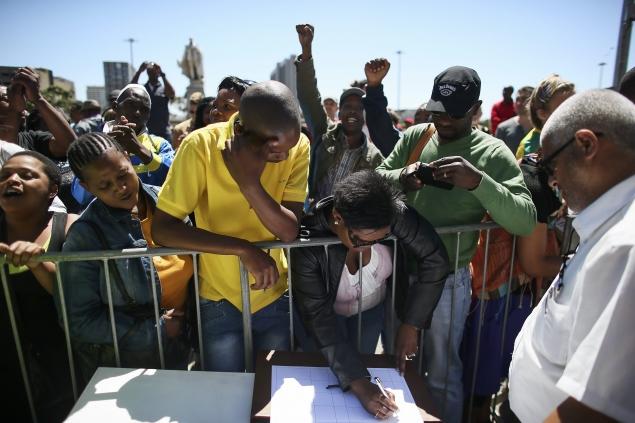
The South African government has announced that a funeral cortege bearing Nelson Mandela’s body will travel through the streets of Pretoria daily on three days before his burial next Sunday.
The government said the cortege will leave a morgue on Wednesday, Thursday and Friday morning to go to the Union Buildings where his body will lie in state.
Mourners are being encouraged to line the route.
Meanwhile, vigils for the former leader are continuing across South Africa.
Hundreds of mourners have gathered outside Nelson Mandela’s home in Johannesburg’s northern suburb of Houghton where he died, and thousands of flowers and candles have been laid outside.
Nelson Mandela – South Africa’s first black president – died on Thursday evening aged 95.

On Saturday, the government published further details of the 10-day state funeral, saying as many people as possible would be given the opportunity to pay their last respects.
On Tuesday, an official memorial service will be held at the FNB Stadium on the outskirts of Johannesburg.
When the three days of lying in state are over, Nelson Mandela’s body will then be flown from an air force base in Pretoria to Qunu in the Eastern Cape for burial.
Qunu is where Nelson Mandela grew up and later retired to.
Flags at all official buildings will fly at half mast throughout the period and books of condolence are being circulated across the country and online for people to post tributes, record memories and express their emotions.
Sunday has been designated an official day of prayer and reflection and President Jacob Zuma urged South Africans to go to stadiums, halls, churches, temples or synagogues.
“We should, while mourning, also sing at the top of our voices, dance and do whatever we want to do, to celebrate the life of this outstanding revolutionary who kept the spirit of freedom alive and led us to a new society. Let us sing for Madiba,” Jacob Zuma said, using Nelson Mandela’s clan name.
Meanwhile, a government statement recalled Nelson Mandela’s own thoughts when asked how he wished to be remembered.
“It would be very egotistical of me to say how I would like to be remembered,” Nelson Mandela said.
“I’d leave that entirely to South Africans. I would just like a simple stone on which is written, <<Mandela>>.”